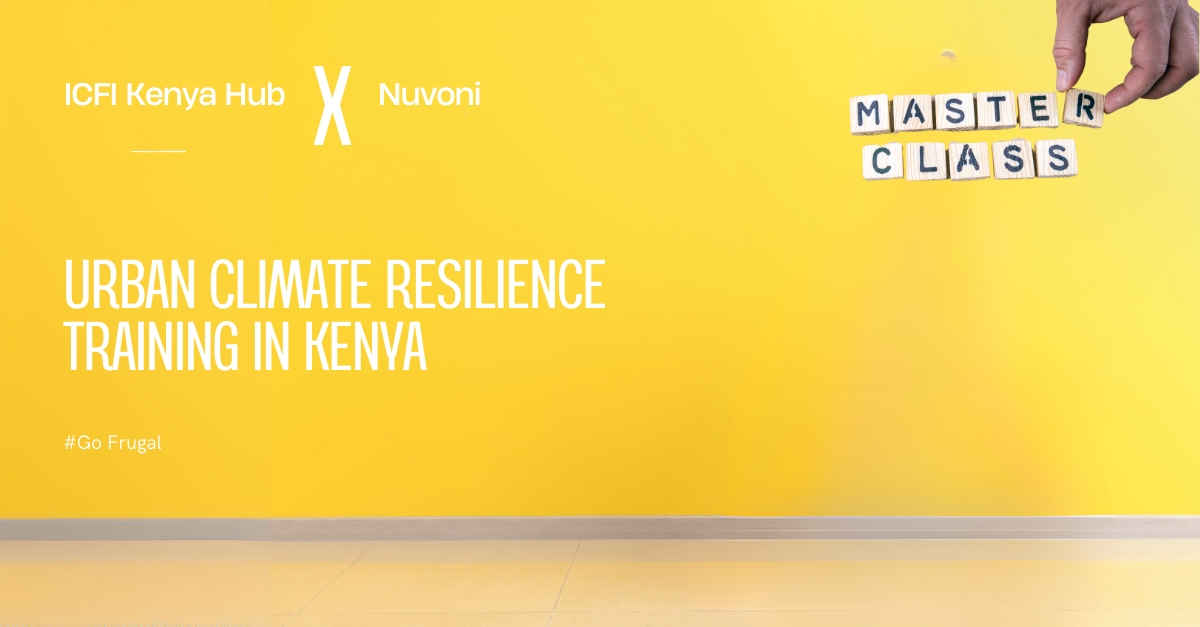The ICFI Kenya Hub / Nuvoni, is set to deliver an intensive Training of Trainers (ToTs) masterclass on Urban Climate Resilience for cities and municipalities across Kenya. This initiative, which positions the Hub / Nuvoni as national consultants, marks a critical step in empowering local officials to address climate-related challenges in urban environments. The training, scheduled from October 22 to 25, 2024, comes after a period of intensive content development and preparation.
The Master Class
The Urban Climate Resilience Master Class (UCRMC), designed by the Global Center for Adaptation (GCA), serves as a vital learning tool for city officials in developing countries. Its primary focus is to help urban planners and officials understand climate risks in their cities and provide them with the skills to design and implement climate-resilient infrastructure. This training is part of a broader effort to combat urban climate vulnerability by promoting equity and resilience.
Course Overview
The UCRMC includes six comprehensive modules, covering topics such as climate risk assessments, locally led adaptation (LLA), climate-resilient infrastructure, and financing options. Each module is designed to provide participants with actionable knowledge to apply in their cities.
The course is divided into six modules:
1. Introduction to Climate Change and Urban Resilience
2. Understanding Climate Risks in Your City
3. Locally Led Adaptation for Urban Resilience
4. Ensuring Climate Resilience of Urban Infrastructure
5. Step-by-Step Guidelines for Delivering Climate Resilient Infrastructure
6. Financing Climate Resilient Urban Infrastructure
The first module is self-paced, offering participants foundational knowledge before joining the in-person training, which emphasizes practical application of concepts to real-world urban challenges.
Learning Objectives
Participants in the UCRMC will:
- Grasp key climate risks and the importance of building climate-resilient infrastructure.
- Collaborate with various stakeholders to promote locally led adaptation (LLA), ensuring that resilience initiatives are inclusive of marginalized groups.
- Learn to incorporate climate resilience into urban planning and infrastructure delivery to surpass conventional approaches.
- Identify financing options to support their investments in climate-resilient urban infrastructure.
- Understand and apply Climate Risk Assessments (CRAs) to inform resilient urban planning.
Collaborations and Acknowledgments
The masterclass has been developed with technical assistance from the Quality Infrastructure Investment Partnership (QII), with contributions from the Government of Kenya, World Bank, Global Center on Adaptation (GCA), and the Kenya School of Government (KSG). Key partners such as the International Institute for Environment and Development (IIED) and Nuvoni Centre for Innovation Research played crucial roles in designing the modules.
Support from the Japan-World Bank Program for Mainstreaming Disaster Risk Management in Developing Countries, alongside invaluable contributions from the Kenya State Department of Housing and Urban Development (SDHUD), Council of Governors, and several academic and professional institutions, ensured the training’s comprehensive approach.
This training represents a significant opportunity for Kenyan cities to enhance their climate resilience strategies and make tangible improvements in urban infrastructure, building a more sustainable and resilient future for city residents across the country.

